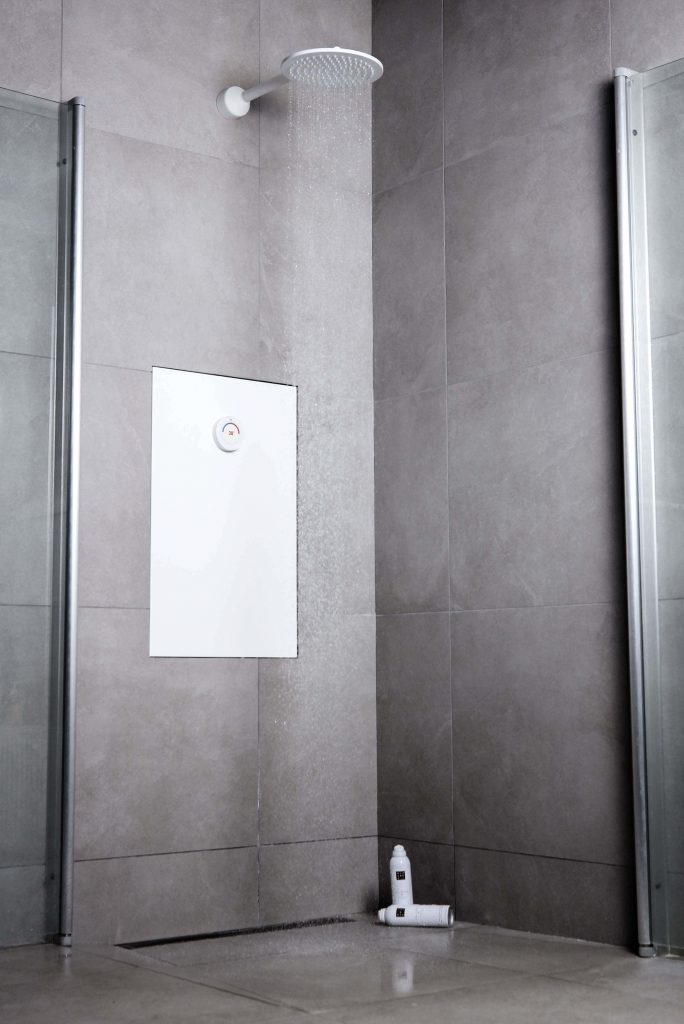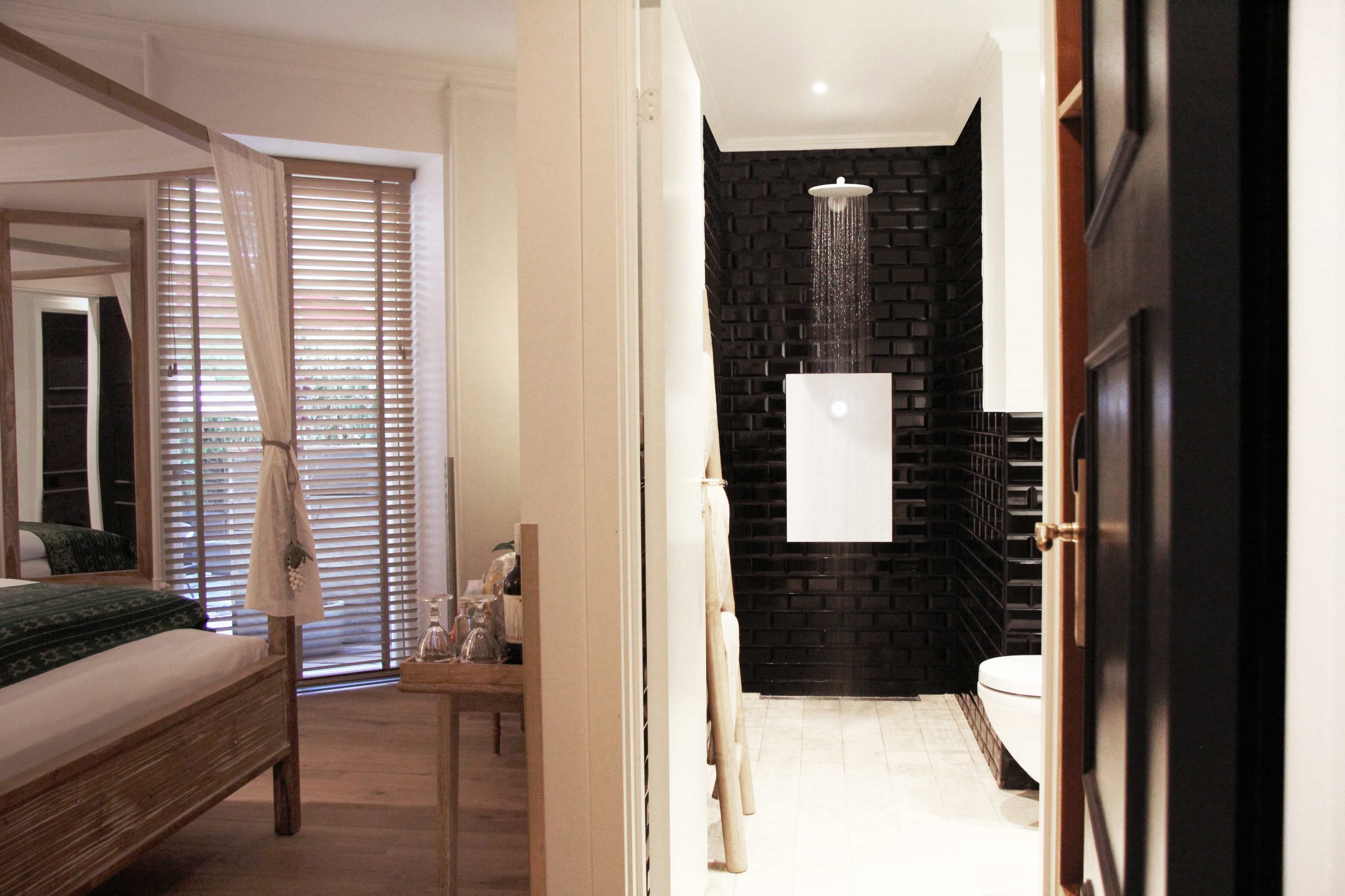A Recirculating Shower, by Orbital Systems
Dear Readers,
Given that William and I want to rely totally on our rainwater pillow for all of our potable and non-potable water needs, we need to seriously consider ways to cut down on our water consumption. A composting toilet is a great way to start. With a standard Clivus Multrum composting toilet, zero water is needed when we contribute our human waste as fertilizer. But beyond the toilet?
Up until now, we had no idea how we were going to cut our water usage especially in the realm of cleaning ourselves. We tossed around the ideas of sponge baths with a limited amount of water that we are allowed to use to rinse ourselves. Or, the push button showers that give you only 30 second intervals of lukewarm water. Maybe even the ol’ “it takes two to take a shower” as one person pours a bottle of water on the other person as they scrub shampoo into their scalp. And, if the water is cold, that would certainly speed up the showering process and limit the water usage…I probably used a grand total of one liter of water (4 cups) to shower when I was in Russia and the water we could get came straight from the frigid Volga river.1 None of these methods of self-cleaning are new, and have all been done before!
However, I can’t really say that I enjoyed my showering methods while in Volgograd…potential hypothermia and sudden heart failure are not things to look forward to during your routine self-cleaning. So, William began his typical determined search for solutions. And, as can be expected when he sets his sights on something, he found one! Dear readers, welcome to the Orbital Shower, the first recirculating shower (that we know of…) on the market!
The Orbital Shower. Credit: Orbital Systems
The Orbital Shower implemented in a hotel room. Credit: Orbital Systems
This shower will not give you hypothermia, and does not come with the direct risk of sudden heart failure due to your body being enveloped in freezing water. You also don’t need a partner to help you bathe yourself2…or a button to continuously push to remind the shower that you are still there. Instead, it saves water and energy by just recirculating your currently being used, warm, shower water.3
It is indeed a recirculating shower…so yes, it reuses some of your bath water as you continue to wash yourself. The water it recirculates is only the ‘clean’ water, as determined by its tech savvy system… And the system knows well enough to not share used shower water between different users!
How the savvy shower system works:
- “Advanced sensors” first decide if the incoming water to the drain should be recycled or discharged.
- If contamination is low, then that water is pre-filtered and purified “through a 1-micron filter and UV-C disinfection before being re-used.”
- When your shower is done, all the recycled water you used during your shower is discharged, and the system does an “automated self-cleaning” before the next user steps in.4
Given that this shower is so systematically savvy, it will require some upkeep…
- Just like your current bathing facility, the floor and drain should be kept clean and clear of hair and other debris.
- The filter capsule needs to be changed every six months, or every 200 showers. So, for a family of 4, if you each take a shower once a day, your filter capsule should be changed every 50 days…or, 7 weeks. You can change the capsules yourself, but they do cost 50 euros a piece (approximately 58 US dollars).
- The UV lamp and quartz glass (which protects the UV lamp) needs cleaned yearly.
- A cleaning program needs to be run once every 20 shower sessions. With a family of 4 who shower once a day, you’ll need to run the cleaning program every 5 days. But, like the smart cookie that the Orbital Shower is, it will remind you when you need to initiate the cleaning program. To initiate the program, all you have to do is put a cleaning tablet (costing about 59 cents each) on the floor of your shower, and the program will remove the lime stone and bacteria from your shower’s system.5
Beyond the cool cleaning technology this shower is capable of, it also has the capacity to connect to wifi and keep track of your water and energy usage~ which is great if you are relying on a rainwater pillow for all of your water supply, and on solar panels and a battery pack for your energy.
Unfortunately, the shower is only available for purchase at this time in Denmark and Sweden…and only available for preorders in Germany. But! We did put our names on their waiting list!! So, maybe, by the time we are actually ready to install a shower in The Seed, they’ll be sending these guys to the U.S.
Now, how much water does it actually save? The Orbital Shower, when run for 10 minutes, uses about 30 liters (7.9 gallons) of water and 0.80 kwh of energy.6 Our shower at home puts out 1.5 gallons per minute. If we take a 10 minute shower, we use 15 gallons of H20. The Orbital Shower uses a little over half that amount in a 10 minute time span. The Orbital Shower also has a 9 liters/minute (2.4 gallons/minute) water flow…so it is a higher water flow than our shower at home, but you are still using less water.
William and I are continuing to research water saving ideas and technology as we proceed with our home’s design. We are aiming to find solutions that decrease our environmental footprint, while simultaneously maintaining a comfortable living space. I’d rather not live with a constant ‘rain anxiety’…never knowing when the next rain will be, and if our rainwater pillow will be able to provide for all of our family’s potable and non-potable needs.
We would like to live consciously. Water is not an infinite resource, and it is becoming harder to find in some parts of the world.7 We would like to live in a home which encourages a lifestyle of awareness and respect for what nature and the earth provide for us…while also still providing for our basic survival needs, like the ability to drink water.
We greatly thank you for reading! Stay healthy, humorous, and humble,
Shelby Aldrich
P.S. You can still pee in the shower with the Orbital System!! Although, I would still highly recommend peeing into your composting toilet…that way your waste at least can be used as fertilizer 🙂 Watch video below with founder Mehrdad Mahdjoubi!
1. Note, I didn’t have to shower with killer cold water all the time…only on the times when it was our apartment building’s turn to have the hot water turned off. Or, when the water was turned off entirely…
2. I mean, unless you want one… 😉
3. I know some of you cringed when you read that…
4. Orbital Systems. “Support and FAQ.” https://orbital-systems.com/support/#faq-section. Accessed on 25 Sept. 2020.
5. Orbital Systems. “Care Guide.” https://orbital-systems.com/support/#oas-care-section. Accessed on 25 Sept. 2020.
6. Orbital Systems. “Use Water Smarter.” https://orbital-systems.com/orbital-shower/. Accessed on 25 Sept. 2020.
7. Bellware, Kim. “Global Water Shortage Risk Is Worse Than Scientists Thought,” HuffPost. 15 Feb. 2016. https://www.huffpost.com/entry/water-scarcity-study_n_56c1ebc5e4b0b40245c72f5e?guccounter=1&guce_referrer=aHR0cHM6Ly93d3cuYmluZy5jb20v&guce_referrer_sig=AQAAANh6Cl2hf8c3fqcmYRY3elNZHyRwj0NJ98-ujXU8WnBFcaWd-yrG6wMSGw3N5uS9MHhX4jZtliCQ7ZpTb9WTPLbnXHct3coTbHwBVWM9VBbDy4XjSEPZJR8q3IQMqkGAysOX4SeWMsustdlfxGRyGCbJpillakTwNbsReBeyYdNm. Accessed on 29 Sept. 2020.
6 Comments
Submit a Comment
© 2020 Sustaining Tree
© 2020 Sustaining Tree



What happens with all of these water saving things if their is a drought?
Hey Aunt Rose, thanks for reading! The main intent behind these water-saving features (for us at least, with the plan to use rainwater collection) is to be ready for a drought at any time. The less water we rely on, the less water we will need – and the longer we would be able to thrive through a drought season.
how about well water…it depends on nature to provide the water …just need a way to let the dirty water go to the septic and the good water go to a french drain the way it use to be before the government got into the picture
myhouse use to only the toilet were connected to the septic; the shower and sinks went to the French drain which got clogged up from the roots of the tree that use to be next to the house
Thanks for reading Gran Ann! You can certainly use well water with the Orbital System. And yes, ideally, greywater should be treated differently than blackwater, but in most cases it is not, nor allowed. Hopefully in the future, as the benefits of this separation become more known, local laws will change and allow for such systems. They may become a little more sophisticated than the traditional French drain, but use the same idea!
Hey guys, did they pay you for promoting them? Or did you stop searching after you find one? We have more systems like that in the market.
And at least one is in Denmark, ladies & gentlemen, Flow Loop https://www.flow-loop.com/
System from Netherlands – Hamwells https://hamwells.com/en/
System from Finland – Shower Loop https://showerloop.org/
System from Canada – Rainstick https://rainstickshower.com/
Enjoy your private recirculating showers.
Whereas I think that those 4 cups or so of water is the best solution for saving our resources.
Hello, Lina!
Thank you for the additional resources for water recycling showers! I didn’t know that many others were out there and already on the market! William and I are actually no longer thinking of going with the Orbital Shower. While we still admire the technology and can see a recirculating shower being an awesome water saving upgrade for any home, it wasn’t saving us enough water for our 100% reliance on rainwater collection. We are instead thinking of going with a push-button shower (similar to what is used on campsites) and a steamer. That way, the water is only flowing to get the user initially wet and then again to rinse off. During that in-between time, the user does not necessarily have to have water flowing from the shower head since the steamer will keep them warm as they go about their daily hygienic rituals 🙂
Thanks for reading!